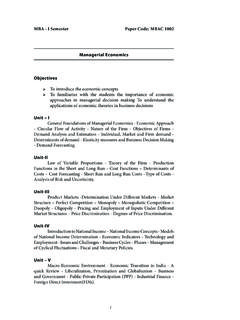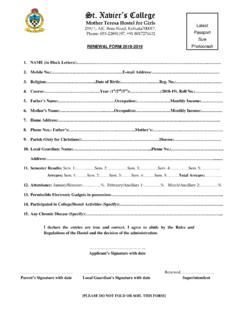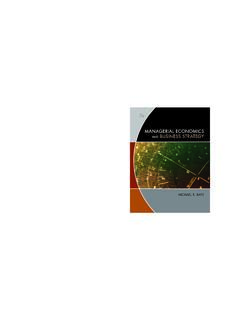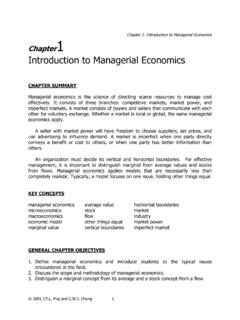Transcription of Managerial Economics - St. Xavier's College
1 1 MBA - I Semester Paper Code: MBAC 1002 Managerial Economics Objectives To introduce the economic concepts To familiarize with the students the importance of economic approaches in Managerial decision making To understand the applications of economic theories in business decisions Unit I General Foundations of Managerial Economics - economic Approach - Circular Flow of Activity - Nature of the Firm - Objectives of Firms - Demand Analysis and Estimation - Individual.
2 Market and Firm demand - Determinants of demand - Elasticity measures and Business Decision Making - Demand Forecasting. Unit-II Law of Variable Proportions - Theory of the Firm - Production Functions in the Short and Long Run - Cost Functions Determinants of Costs Cost Forecasting - Short Run and Long Run Costs Type of Costs - Analysis of Risk and Uncertainty. Unit-III Product Markets -Determination Under Different Markets - Market Structure Perfect Competition Monopoly Monopolistic Competition Duopoly - Oligopoly - Pricing and Employment of Inputs Under Different Market Structures Price Discrimination - Degrees of Price Discrimination.
3 Unit-IV Introduction to National Income National Income Concepts - Models of National Income Determination - economic Indicators - Technology and Employment - Issues and Challenges Business Cycles Phases Management of Cyclical Fluctuations - Fiscal and Monetary V Macro economic Environment - economic Transition in India - A quick Review - Liberalization, Privatization and Globalization - Business and Government - Public-Private Participation (PPP) - Industrial Finance - Foreign Direct Investment(FDIs). 2 References 1.
4 Yogesh Maheswari, Managerial Economics , Phi Learning, Newdelhi, 2005 Gupta , 2. Managerial Economics , Tata Mcgraw-Hill, New Delhi Moyer &Harris, 3. Anagerial Economics , Cengage Learning, Newdelhi, 2005 Geetika, Ghosh & Choudhury, , 4. Managerial Economics , Tata Mcgrawhill, Newdelhi, 2011**3 UNIT ILesson I The Fundamentals Of Managerial EconomicsReading Objective: At the end of the reading this chapter, the reader will be able to understand that Economics is the study of mankind s attempt to satisfy their unlimited wants with the help of limited resources.
5 Economics maybe divided in to 1) Micro Economics and 2) Macro Economics 3) Monitory Economics and 4) Fiscal Economics . Micro Economics deals with the basic principles of Economics like law of demand, law of supply, consumption, production etc,. Managerial Economics deals with the principles of micro Economics as applied to Managerial decision making. The reader may also be able understand the circle flow of economic activity. The circle flow is a chain in which production creates income, income leads to spending and spending in turn leads to production Outline: Why study Economics ?
6 Managerial Economics Nature of Managerial Economics Circular flow of economic activity Objectives of the firm Review questions4 Introduction People have limited number of needs which must be satisfied if they are to survive as human beings. Some are material needs, some are psychological needs and some others are emotional needs. People s needs are limited; however, no one would choose to live at the level of basic human needs if they want to enjoy a better standard of living. This is because human wants (desire for the consumption of goods and services) are unlimited.
7 It doesn t matter whether a person belongs to the middle class in India or is the richest individual in the World, he or she wants always something more. For example bigger a house, more friends, more salary etc., Therefore the basic economic problem is that the resources are limited but wants are unlimited which forces us to make choices. Economics is the study of this allocation of resources, the choices that are made by economic agents. An economy is a system which attempts to solve this basic economic problem.
8 There are different types of economies; household economy, local economy, national economy and international economy but all economies face the same problem. The major economic problems are (i) what to produce? (ii) How to produce? (iii) When to produce and (iv) For whom to produce? Economics is the study of how individuals and societies choose to use the scarce resources that nature and the previous generation have provided. The world s resources are limited and scarce. The resources which are not scarce are called free goods.
9 Resources which are scarce are called economic Study Economics ? A good grasp of Economics is vital for Managerial decision making, for designing and understanding public policy, and to appreciate how an economy functions. The students need to know how Economics can help us to understand what goes on in the world and how it can be used as a practical tool for decision making. Managers and CEO s of large corporate bodies, managers of small companies, nonprofit organizations, service centers etc., cannot succeed in business without a clear understanding of how market forces create both opportunities and constraints for business For Studying Economics : It is a study of society and as such is extremely important.
10 It trains the mind and enables one to think systematically about the problems of business and wealth. From a study of the subject it is possible to predict economic trends with some precision. It helps one to choose from various economic alternatives. Economics is the science of making decisions in the presence of scarce resources. Resources are simply anything used to produce a good or service to achieve a goal. economic decisions involve the allocation of scarce resources so as to best meet the Managerial goal.













